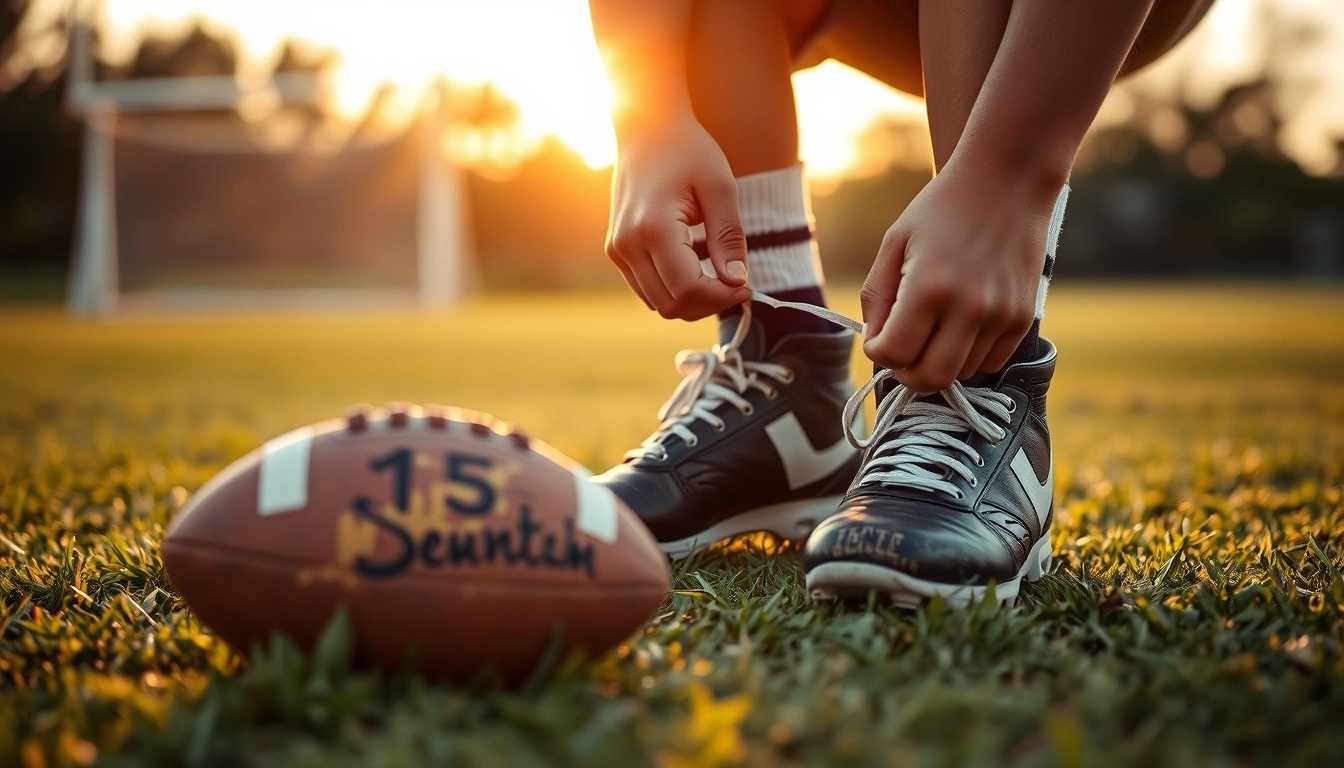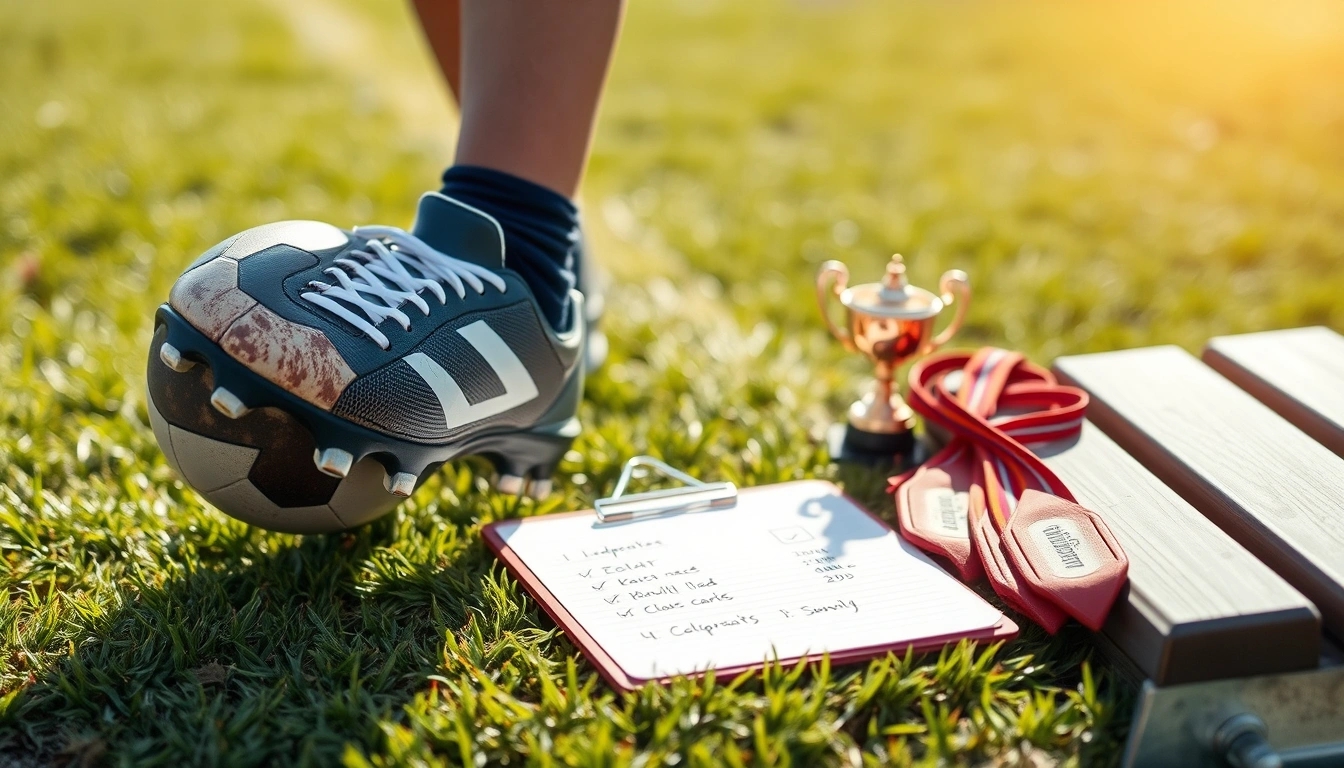Confidence — it’s that elusive beast that can either rocket a young footballer to stardom or leave them stuck on the sidelines, wondering if they’ll ever get that big break. Let’s be real: confidence isn’t just about swagger or fancy footwork; it’s the backbone of every tackle, pass, and goal. But how do you actually build it, especially when you’re fresh on the pitch and the pressure’s mounting? Buckle up, because we’re diving deep with some no-nonsense advice.
Understanding Confidence in Football
First off, confidence isn’t some magical aura you’re born with. It’s more like a muscle—you gotta work it out regularly. On the field, confidence means trusting your skills, decisions, and instincts even when the crowd’s roaring or the scoreboard’s not in your favor. Without it, hesitation creeps in, and trust me, hesitation in football can be as deadly as a red card.
Setting Realistic Goals
Look, we all want to be the next Messi or Ronaldo overnight, but setting sky-high goals can backfire faster than a missed penalty. Instead, aim for bite-sized targets. Maybe it’s nailing that tricky dribble or improving your stamina by a few minutes each week. These small wins stack up and keep your morale high.
| Goal Type | Example | Why It Matters |
|---|---|---|
| Short-Term | Complete 50 successful passes in practice | Builds immediate confidence and focus |
| Mid-Term | Score in next 3 matches | Keeps motivation steady and measurable |
| Long-Term | Make the school team by season end | Provides a clear vision for growth |
Practice Makes (Almost) Perfect
Yeah, practice can be a drag. Repeating the same drills until your legs scream “enough!” But here’s the kicker: that repetition is what builds muscle memory and, more importantly, belief in your abilities. Even if you don’t see instant results, trust the process. Confidence grows quietly in those early mornings and late evenings on the pitch.
- Warm-up consistently to avoid injuries and stay sharp
- Focus on weak spots; don’t just play to strengths
- Record your sessions to spot progress and flaws
Dealing with Mistakes and Failure
Mistakes? Oh, they’re gonna happen. And guess what? That’s not just okay—it’s necessary. Every missed shot or lost ball is a lesson wrapped in frustration. Instead of beating yourself up, analyze what went wrong and move on. The best players out there have a long history of screw-ups; their secret? They didn’t let those moments define them.
The Role of Coaches and Mentors
A good coach is like a lighthouse in a stormy sea. Their feedback can either lift you up or leave you feeling crushed. Find mentors who push you but also believe in you. Constructive criticism is gold, but remember: not all advice is gospel. Learn to filter what helps and ditch what drags you down.
Building Mental Toughness
Football isn’t just about fancy footwork; it’s a mental battle too. Pressure, nerves, and setbacks can mess with your head. Building mental toughness means learning to stay calm, focused, and hungry even when things get rough. Techniques like controlled breathing, mindfulness, or simply talking things out with teammates can make a world of difference.
Using Visualization and Positive Self-Talk
Okay, this might sound a bit “new age,” but hear me out. Visualizing yourself scoring that winning goal or making a killer pass can actually prep your brain for success. Pair that with positive self-talk—no, not the cheesy “I’m the best” stuff, but realistic encouragement like “I’ve trained for this” or “I can handle this pressure.” It’s like giving your confidence a pep talk.
Learning from Role Models and Peers
Watching your heroes play is inspiring, but beware the comparison trap. Everyone’s journey is different. Instead, focus on what you can learn from their style, work ethic, and attitude. Surround yourself with peers who lift you up, not those who make you doubt yourself.
Tracking Progress and Celebrating Wins
Finally, don’t forget to track your progress. Keep a journal or app to note improvements and setbacks. Celebrate the small victories—maybe a clean tackle, a good assist, or just showing up on a tough day. These moments fuel your confidence long-term.
Summary Table: Confidence Boosters for Young Footballers
| Strategy | Why It Works | Quick Tip |
|---|---|---|
| Set Realistic Goals | Keeps motivation steady | Break big goals into small steps |
| Consistent Practice | Builds skill and belief | Stick to a routine, even when bored |
| Embrace Mistakes | Turns failure into learning | Reflect, don’t regret |
| Positive Self-Talk | Boosts mental resilience | Use encouraging phrases daily |
| Supportive Coaches | Provides guidance and feedback | Seek mentors who believe in you |
So, yeah, confidence isn’t handed out like trophies. It’s earned, scraped for, and sometimes lost and found again. But with the right mindset, practice, and support, any young footballer can build it from the ground up—and maybe, just maybe, surprise even themselves on the pitch.
Understanding Confidence in Football
Before you even lace up your boots and step on that patch of green, it’s crucial to wrap your head around what confidence really means in football. It’s not just about fancy footwork or scoring goals like a pro; it’s this invisible force that shapes how you think, react, and push through the chaos on the pitch. You might think confidence is just “feeling good,” but nope, it’s way more layered than that.
Think of confidence as your footballing fuel — it powers your decisions, your creativity, and yes, even your mistakes. When you trust your skills, you play freer, take risks, and don’t get frozen by pressure. But here’s the kicker: confidence isn’t something you’re born with; it’s built, chipped away, lost, and rebuilt again. Sometimes it’s fragile, other times it’s rock solid. The trick? Knowing how to nurture it.
- Confidence isn’t arrogance. It’s not about thinking you’re the best player on the pitch all the time. It’s about believing you can handle whatever comes your way.
- It’s a mindset. You can have all the talent in the world, but without confidence, you’ll hesitate, second-guess, and miss chances.
- It’s about resilience. When you mess up—which you will—confidence helps you bounce back instead of spiraling into self-doubt.
Now, let’s get real: confidence can be a slippery beast. One minute you’re on fire, dribbling past defenders like a magician, and the next, you’re tripping over your own feet wondering what just happened. That’s football for you! The game throws curveballs, and your confidence can take a hit when things don’t go your way.
| Confidence Boosters | Confidence Killers |
|---|---|
| Consistent practice and preparation | Dwelling on mistakes and failures |
| Positive self-talk and visualization | Negative feedback without constructive advice |
| Supportive teammates and coaches | Comparing yourself harshly to others |
| Setting achievable goals | Unrealistic expectations leading to burnout |
Here’s a little secret: confidence isn’t a constant state. It fluctuates like the scoreline in a nail-biter. What matters is how you manage those ups and downs. A confident player doesn’t mean a flawless player; it means someone who keeps showing up, keeps trying, and doesn’t let a bad game define their worth.
So, next time you step onto the pitch feeling jittery or unsure, remind yourself that confidence is a muscle. It grows stronger every time you step out of your comfort zone, take that shot, or even just try something new. And if you stumble? Well, that’s just part of the game.
Quick Tips to Kickstart Your Confidence:
- Focus on what you can control — your effort and attitude.
- Celebrate small wins, like a clean pass or a good tackle.
- Practice visualization: picture yourself succeeding before the match.
- Talk to yourself like a coach, not a critic.
Remember, confidence is less about being perfect and more about being fearless enough to keep going. In football, as in life, that’s half the battle won.
Setting Realistic Goals
Alright, let’s get real for a sec—goals are like your GPS on the football field. Without them, you’re basically wandering around hoping to stumble on success. But here’s the kicker: if your goals are sky-high, like dreaming of scoring the winning goal in the World Cup next month when you’re just learning to dribble, you’re setting yourself up for a major faceplant. Conversely, if your goals are so low that even tying your shoelaces counts as a win, well, you might not even break a sweat or feel that sweet buzz of achievement.
So, how do you find that magic middle ground? It’s all about being honest with yourself and having a bit of patience. Goals should challenge you enough to push your limits but not so much that they make you want to hide under the bench. Think of it like this: setting goals is like seasoning your food—too little, and it’s bland; too much, and it’s inedible.
- Start Small: Instead of aiming to be the next Messi overnight, focus on mastering a basic skill like controlling the ball or improving your passing accuracy.
- Be Specific: “Get better at football” is vague. Try “complete 20 successful passes in practice” or “improve sprint speed by 0.5 seconds.”
- Make It Measurable: You gotta know when you’ve hit the target. Keep track of your progress with simple stats or notes.
| Goal Type | Example | Why It Works |
|---|---|---|
| Short-term | Practice free kicks 3 times a week | Builds habit and immediate progress |
| Medium-term | Score in a local tournament within 6 months | Keeps motivation alive with a clear deadline |
| Long-term | Join a professional academy in 2 years | Gives you a big-picture vision to strive for |
Here’s where it gets tricky—sometimes your goals might need a little tweaking. Maybe you thought you’d nail 50 push-ups by now, but reality check: your arms feel like jelly after 20. No shame in dialing it back or breaking that big goal into smaller chunks. Trust me, it’s about progress, not perfection.
And don’t forget, goals aren’t set in stone. Life throws curveballs—injuries, school stress, or just plain bad days. Being flexible means you can adjust your goals instead of beating yourself up.
Tips for Adjusting Your Goals:- Reassess every month: Are you too easy or too hard on yourself?- Celebrate small wins: Even improving your weaker foot counts.- Ask for feedback: Coaches and teammates can give you a reality check.- Stay positive: Remember, setbacks are just setups for comebacks.
At the end of the day, setting realistic goals is about building confidence and keeping the fire alive without burning out. So, dream big, but lace up your boots firmly on the ground. Your future self will thank you.

Practice Makes (Almost) Perfect
Look, let’s be honest — repetition can be a total snooze fest. Doing the same drill over and over? Yawn. But here’s the kicker: it’s exactly what separates the good from the great on the football pitch. You might not see the magic right away, and yeah, sometimes it feels like you’re stuck in a never-ending loop of “kick, run, repeat.” But trust me, that grind is where muscle memory gets forged and, more importantly, where your confidence starts to quietly build itself up.
When you first start practicing a skill — say, dribbling or shooting — it’s clumsy. You miss more than you hit, and it’s frustrating as heck. But each repetition is like a tiny investment in your future self. Your brain and muscles start syncing up, creating a kind of “autopilot” mode. That means, in a game, you don’t have to overthink every move. Instead, your body just *knows* what to do. That’s muscle memory in action, and it’s a game-changer.
| Why Repetition is a Must | What It Builds |
|---|---|
| Improves technique through constant practice | Muscle memory — making moves automatic |
| Allows you to learn from mistakes in real-time | Self-belief as you see small improvements |
| Helps you stay calm under pressure | Confidence to take risks during matches |
Now, don’t get me wrong — it’s not all sunshine and rainbows. Sometimes, you’ll feel like you’re banging your head against a brick wall. You’ll wonder if all this effort is worth it, especially when results don’t show up on the scoreboard immediately. That’s the tricky part. Instant gratification? Rarely happens in football training. But here’s the secret sauce: consistent practice doesn’t just make you better physically; it builds your mental armor. You start to trust yourself more because you *know* you’ve put in the work.
- Tip #1: Break your practice into small, focused sessions. Quality beats quantity every time.
- Tip #2: Mix it up to avoid boredom — dribble drills, passing, shooting, agility exercises.
- Tip #3: Keep a journal or video log of your progress. Seeing tiny wins adds fuel to your confidence tank.
And here’s a little curveball — don’t be afraid to mess up during practice. Seriously, screw-ups are your best teachers. Each mistake is a stepping stone, not a sign you’re failing. The more you embrace those moments, the less scary they become in real matches. Your brain learns faster, and your confidence gets a boost because you’re not afraid to try.
So, yeah, repetition might feel like a drag, but it’s the backbone of every young footballer’s success story. Keep grinding, trust the process, and remember: every kick, pass, and sprint is quietly building the player — and the confident person — you want to be.
Dealing with Mistakes and Failure
Alright, let’s get real for a sec — messing up on the pitch? It’s not just common, it’s practically a rite of passage. If you think the pros never screw up, well, you’re living in a fantasy league. The truth is, mistakes and failures are the secret sauce to building rock-solid confidence as a young footballer. Sounds weird? Stick with me.
First off, nobody’s perfect. When you miss that easy shot or trip over your own feet, it can feel like the world’s ending. But here’s the kicker: every single error is a golden opportunity to learn something new. Instead of beating yourself up, try flipping the script. Ask yourself, “What can this teach me?” That mindset shift alone can turn a total disaster into a stepping stone.
- Own your mistakes — Don’t hide them or pretend they didn’t happen. Own it, analyze it, then move on.
- Stay curious — What went wrong? Was it positioning, timing, or just bad luck?
- Practice smarter — Use errors as clues for what to focus on in your next training session.
Now, here’s where most young players get stuck: letting one bad moment spiral into a confidence meltdown. Trust me, we’ve all been there, staring at the ground wondering if we’re even cut out for the game. But guess what? That’s exactly when you need to remind yourself that failure is part of the process, not the end of the road.
| Mistake | Why It Happens | How to Recover |
|---|---|---|
| Missing an easy goal | Nerves or rushing | Take a deep breath, visualize the shot next time, and don’t rush your chances |
| Poor positioning | Not reading the game well | Watch replays, ask coach for tips, and practice situational drills |
| Giving away possession | Pressure from opponents or bad touch | Work on ball control under pressure and stay calm when tackled |
Here’s a nugget of wisdom: confidence doesn’t mean you suddenly become perfect. Nope. It means you get comfortable being uncomfortable. When you embrace mistakes, your brain stops freaking out every time you mess up and starts focusing on solutions instead. That’s how you build mental toughness — by learning that failing isn’t fatal.
And hey, don’t forget the power of a good laugh. Sometimes, you just have to chuckle at yourself. That missed pass that led to an opponent’s goal? Yeah, it stings, but it’s also a great story to tell your mates later. Humor is one of the best ways to keep your head up and keep trying.
In the end, the pitch is your laboratory. Every mistake is an experiment that brings you closer to the player you want to be. So, next time you mess up, instead of letting it crush your confidence, let it fuel your fire. Remember, even the legends started as total rookies fumbling around — and look where they ended up!
The Role of Coaches and Mentors
When it comes to shaping a young footballer’s confidence, coaches and mentors hold the keys to the kingdom—seriously, their influence can be a game-changer or a total confidence crusher. It’s not just about shouting instructions from the sidelines or drilling tactics; it’s about how they connect, communicate, and *really* support their players. You might think, “Hey, a coach just tells you what to do, right?” Well, yeah, but there’s a lot more beneath the surface.
Positive feedback fuels confidence like rocket fuel. Imagine a coach who notices the small wins—a perfectly timed pass, a clever run off the ball—and calls it out. That kind of acknowledgment can make a kid’s chest puff up with pride and push them to try even harder. On the flip side, constant criticism without guidance? That’s a quick way to deflate even the most eager player.
- Constructive criticism: It’s all about balance. Coaches should point out what needs fixing but also show how to improve.
- Encouragement: Sometimes, a simple “You’re getting there” or “Keep pushing” can spark a player’s belief.
- Listening: Mentors who take time to understand a player’s fears and hopes build trust, which is the foundation of confidence.
Now, it’s not all sunshine and rainbows. Some coaches unintentionally kill confidence by focusing too much on mistakes or playing favorites. Ever heard a coach say, “Why can’t you be more like so-and-so?”—ouch. That’s a confidence killer, plain and simple. Young players start doubting themselves, wondering if they’ll ever measure up. And trust me, that doubt creeps into their game, making them hesitant and less effective.
| Coach Behavior | Impact on Player Confidence |
|---|---|
| Positive reinforcement | Boosts self-belief and motivation |
| Overly critical without guidance | Leads to self-doubt and anxiety |
| Ignoring player input | Creates disconnect and lowers trust |
| Consistent support and mentorship | Builds resilience and growth mindset |
Mentors, who often are former players or experienced coaches, add another layer to this dynamic. They can share stories of their own struggles, making young players realize that failure is part of the journey, not the end of it. This kind of real talk is priceless. It’s like having a roadmap when you’re lost in the woods.
Practical tip for young footballers: Don’t be afraid to seek feedback and ask questions. A good coach won’t mind, and it shows you’re serious about improving. And if the feedback feels harsh or unfair? Talk it out with someone you trust—a parent, another coach, or a mentor. Confidence isn’t built in isolation; it’s a team effort.
In the end, coaches and mentors aren’t just there to teach football skills—they’re shaping the player’s mindset and self-worth. When they get it right, they build champions on and off the pitch. When they get it wrong, well… let’s just say the road to confidence gets a lot bumpier.

Building Mental Toughness
Football isn’t just about those killer footwork and sprint speeds; honestly, the real game is often played inside your own head. You can be the fastest, strongest player out there, but if your mind cracks under pressure, well, good luck keeping up. Mental toughness is like that secret sauce—sometimes overlooked but absolutely essential if you want to stick around and thrive in this sport. So, how do you build it? Here’s the lowdown.
First off, resilience is your best mate here. It’s not about never falling but about how quickly you bounce back when things go south. Imagine missing a crucial penalty or getting benched for a game—you’ve got two choices: sulk forever or shake it off and get back to work. The latter is what separates the pros from the “also-rans.”
- Accept setbacks: Don’t pretend mistakes didn’t happen. Own them.
- Learn from failures: Ask yourself what went wrong and how to fix it next time.
- Stay positive: Easier said than done, but a hopeful mindset keeps you moving forward.
Now, let’s talk about pressure—the kind that makes your heart race and palms sweat before a big match. Here’s a quick table to break down some practical ways to keep your cool:
| Challenge | Strategy | Why It Works |
|---|---|---|
| Pre-match nerves | Deep breathing exercises | Slows heart rate, calms mind |
| Feeling overwhelmed | Break tasks into smaller steps | Makes goals manageable, reduces stress |
| Negative self-talk | Replace with positive affirmations | Builds confidence, shifts mindset |
Don’t underestimate the power of routine either. Having a pre-game ritual—whether it’s listening to your favorite pump-up song or visualizing your best moves—grounds you. It’s like telling your brain, “Alright, time to get serious.” And trust me, your brain loves some predictability when chaos is about to unfold on the pitch.
Here’s a quick checklist to boost mental toughness during training and games:
- Practice focus drills to improve concentration
- Simulate high-pressure situations in training
- Keep a journal of your mental highs and lows
- Talk to teammates or mentors about mental struggles
- Celebrate small victories, not just goals scored
Lastly, remember that mental toughness isn’t built overnight. It’s a grind, a daily hustle. Some days you’ll feel like a rockstar, other days you’ll want to throw in the towel. And that’s okay. The trick is not giving up, no matter how tempting it gets. So, next time you’re sweating bullets before a match or kicking yourself after a blunder, remind yourself: mental grit is what keeps the game alive, both on and off the field.
Keep pushing, keep believing, and eventually, that mental muscle will be as strong as your legs.
Using Visualization and Positive Self-Talk
Alright, so this might sound a little out there—maybe even a bit “woo-woo” as some folks like to say—but trust me, imagining yourself succeeding on the pitch can actually do wonders for your game day mojo. Picture this: you’re about to step onto the field, heart pounding, palms sweaty, and instead of spiraling into a panic, you’ve already seen yourself score that winning goal or make that slick pass in your mind. Sounds cheesy? Maybe. But this mental rehearsal is a legit tool used by pros to sharpen focus and boost confidence.
Now, before you roll your eyes and think, “Yeah, yeah, whatever,” let’s break down why this works. When you visualize, your brain activates the same neural pathways as if you were physically doing the action. It’s like a mental dress rehearsal. So when the real deal comes around, your body kinda knows what to do without freaking out. Plus, pairing that with positive self-talk—like telling yourself, “I got this,” or “I’m ready”—helps drown out the annoying little voice that loves to say, “You’ll mess up.”
| Visualization Tips | Positive Self-Talk Examples |
|---|---|
| Close your eyes and imagine the game scenario | “I am prepared and focused.” |
| Picture yourself handling pressure calmly | “Mistakes happen; I learn and move on.” |
| Visualize the crowd cheering your success | “I am improving every day.” |
But hey, don’t expect miracles overnight. It’s not like you’ll suddenly become Messi just by thinking about it. It takes practice. Like anything else in football, you gotta put in the reps with your mind as much as with your feet. The cool part? This mental work is something you can do anywhere—on the bus, before bed, or even in the shower (just don’t slip!).
One sneaky trick is to catch yourself when negative thoughts sneak in. Instead of letting them run wild, flip the script. For example, if you think, “I’m terrible at shooting,” change it to, “I’m working on my shooting every day, and I’m getting better.” It’s like giving your brain a pep talk instead of a scolding. Weirdly, this can actually help you perform better because your brain starts believing the positive stuff.
- Start small: Spend 5 minutes daily visualizing simple plays.
- Be consistent: Make positive self-talk a habit, not a one-time thing.
- Use reminders: Write affirmations on your gear or locker.
At the end of the day, visualization and positive self-talk aren’t magic potions, but they’re powerful tools in your confidence toolkit. So next time you’re gearing up for a match, give your brain a little warm-up too. You might just surprise yourself—and hey, if it feels a bit silly, just remember: some of the greatest athletes swear by it. And if it helps you keep your cool and play your best, who’s laughing now?
Learning from Role Models and Peers
Watching others do their thing on the football pitch can be pure gold for any young player trying to find their feet. But here’s the catch: it’s not just about staring wide-eyed at the stars or your teammates and blindly copying everything they do. Nope, there’s a bit of an art to picking the right role models and steering clear of the dreaded comparison trap that can mess with your head.
First off, let’s talk about role models. These aren’t just the flashy pros you see on TV pulling off insane tricks or scoring worldies every weekend. A good role model is someone whose attitude, work ethic, and mindset you can genuinely respect and learn from. Maybe it’s your local club captain who never gives up, or a coach who’s got your back even when you mess up big time. The key here? Look beyond just talent. Focus on how they handle pressure, bounce back from mistakes, and keep grinding day after day.
- Tip 1: Choose role models who inspire you to be better, not just those who seem perfect.
- Tip 2: Observe their habits—training routines, attitude towards setbacks, and how they communicate with teammates.
- Tip 3: Remember, nobody’s flawless. Even Messi or Ronaldo have off days!
Now, onto the sticky bit: comparison. It’s super tempting to measure yourself against others, especially when social media is flooded with highlight reels and stats. But beware—the comparison trap is a sneaky confidence killer. It’s easy to get stuck thinking, “Why can’t I do that?” or “I’ll never be as good as them.” Spoiler alert: that mindset does nothing but hold you back.
| Comparison Trap | Healthy Learning |
|---|---|
| Focuses on others’ strengths only | Focuses on your own growth and progress |
| Leads to frustration and self-doubt | Encourages motivation and self-improvement |
| Ignores individual differences and journey | Respects personal pace and unique challenges |
So, how do you keep it real? Think of role models and peers as guides, not rivals. Watch how they play, what makes them tick, and pick up tips that fit your style and personality. Don’t try to be a carbon copy; instead, mix and match what works for you.
- Ask questions: How do they prepare before a big game? What do they do when they feel nervous?
- Share experiences with your peers—sometimes your teammate’s struggles and wins are closer to home and super relatable.
- Celebrate your own milestones, no matter how small. Confidence feeds on wins, even tiny ones.
In the end, learning from others is like having a toolbox—you don’t use every tool on every job, but having options makes you better prepared. So, keep your eyes open, your ego in check, and remember: the best player you can be is the unique one you already are.

Tracking Progress and Celebrating Wins
Alright, let’s be real for a second — when you’re grinding day in and day out on the football pitch, sometimes it feels like you’re running in circles. You’re busting your chops, sweating buckets, but that scoreboard in your head barely budges. That’s where tracking your progress and celebrating the small wins comes into play. It’s not just some cheesy motivational mumbo jumbo; it’s actually a game-changer for your confidence and mindset.
Think about it like this: football is a marathon, not a sprint. You don’t wake up one day and suddenly become Messi or Ronaldo. It’s about those tiny steps forward — nailing a tricky pass, improving your stamina, or even just showing up consistently. When you keep tabs on these little victories, you’re basically giving yourself a pat on the back every now and then, which is crucial for confidence. Without that, it’s easy to spiral into frustration or doubt.
- Keep a Journal: Jot down your daily or weekly achievements, no matter how small. Did you score a goal in practice? Write it down. Managed to run an extra lap? Note it.
- Use Apps or Trackers: There are tons of fitness and skill-tracking apps out there. Find one that suits your style and start logging your progress.
- Set Mini-Milestones: Instead of aiming to “become the best,” break it down. For example, “improve my shooting accuracy by 10% in a month.”
| Why Track Progress? | How to Celebrate Wins |
|---|---|
| Helps you see real improvement over time | Give yourself a treat (ice cream, anyone?) |
| Keeps motivation alive during tough patches | Share your success with teammates or family |
| Builds a positive feedback loop for confidence | Set a new goal to keep the momentum going |
Now, celebrating wins doesn’t mean throwing a party every time you do a decent dribble, but acknowledging your progress is key. Even a quick fist pump or a mental “yes!” counts. It’s about rewiring your brain to recognize growth instead of fixating on mistakes or losses.
Here’s a little secret: confidence is a bit like a bank account. You gotta keep making deposits — those small wins — or else you’re gonna be broke emotionally when the tough games hit. So, don’t wait for the big trophies or the crowd’s roar. Celebrate that extra push-up you managed, or the one-on-one you didn’t lose. It all adds up.
Practical Tip:- At the end of each week, review your progress notes.- Pick 2-3 things you improved on.- Celebrate in a way that feels good to you (a cheat meal, a night off, a shoutout to your coach).- Plan your next mini-goal based on what you learned.
In the end, tracking your growth and celebrating those milestones keeps your confidence soaring higher than a last-minute goal in extra time. So, embrace the journey, cheer for your small wins, and watch how your belief in yourself turns into unstoppable momentum on the pitch.
Frequently Asked Questions
- What exactly is confidence in football, and why is it so important?
Confidence in football is like the fuel that powers your engine on the pitch. It’s believing in your skills, decisions, and ability to handle pressure. Without it, even the best players can freeze up. Confidence shapes your mindset and directly impacts how you perform during games and training.
- How do I set realistic goals that actually help me improve?
Think of goals as your personal GPS—they guide your journey. Setting goals too high can feel overwhelming, while too low might bore you. Aim for targets that challenge you just enough to stretch your skills without breaking your spirit. Break big goals into smaller, manageable steps to keep your motivation alive.
- Why is repetitive practice so crucial, even when it gets boring?
Practice might feel like a never-ending loop, but it’s the secret sauce for building muscle memory and self-belief. Repetition turns awkward moves into automatic skills, so when game day arrives, you don’t have to think twice. It’s like training your brain and body to work in perfect harmony.
- How should I handle mistakes and failures on the field?
Messing up isn’t a setback—it’s a setup for growth. Every error is a lesson wrapped in disguise. Instead of beating yourself up, try to analyze what went wrong and how to fix it. Embracing mistakes builds resilience and actually boosts your confidence over time.
- What role do coaches and mentors play in building my confidence?
Coaches and mentors are like your personal cheerleaders and guides. Their feedback, support, and belief in you can lift your confidence sky-high. But beware—negative or harsh criticism can do the opposite. Find mentors who encourage growth and help you see your potential.
- How can I develop mental toughness to stay focused under pressure?
Mental toughness is your brain’s armor against stress and distractions. You build it by practicing focus, staying positive, and learning to bounce back from setbacks quickly. Think of it as training your mind to stay cool when the heat is on.
- Is visualization and positive self-talk really effective?
Absolutely! Visualizing success and speaking kindly to yourself might sound a bit “woo-woo,” but they’re powerful tools. They prepare your mind to believe in positive outcomes, which can translate into better performance and less anxiety on match day.
- How do I choose the right role models without falling into the comparison trap?
Role models are like lighthouses guiding your path, but comparing yourself constantly to them can dim your own shine. Pick players whose attitude and work ethic inspire you, not just their talent. Learn from their journey, but remember your story is unique.
- Why is tracking progress and celebrating small wins important?
Progress tracking is your personal scoreboard, showing how far you’ve come. Celebrating small victories keeps your motivation high and confidence growing. It’s like planting seeds of success that bloom into bigger achievements over time.













